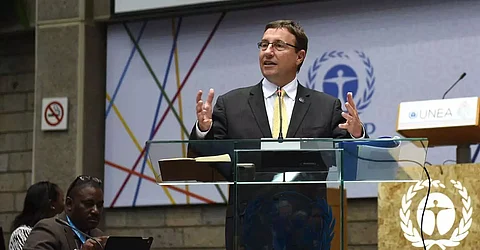
- Home
- Live Blog
- Breaking News
- Top Headlines
- Cities
- NE News
- Sentinel Media
- Sports
- Education
- Jobs

NAIROBI: A green pandemic recovery could cut upto 25 per cent off predicted 2030 greenhouse gas emissions and bring the world closer to meeting the two degree celsius goal of the Paris Agreement on climate change, said a new UN Environment Programme (UNEP) report on Wednesday.
The UNEP's annual Emissions Gap Report 2020 reveals that despite a dip in the 2020 carbon dioxide emissions caused by the COVID-19 pandemic, the world is still heading for a temperature rise in excess of three degree celsius this century.
However, if governments invest in climate action as part of pandemic recovery and solidify emerging net-zero commitments with strengthened pledges at the next climate meeting — taking place at Glasgow in November 2021 — they could bring emissions to levels broadly consistent with the two degrees celsius goal.
By combining a green pandemic recovery with swift moves to include new net-zero commitments in the updated Nationally Determined Contributions (NDCs) under the Paris Agreement, and following up with rapid and robust action, governments could still attain the more ambitious 1.5 degrees goal.
"The year 2020 is on course to be one of the warmest on record while wildfires, storms and droughts continue to wreak havoc," said UNEP's Executive Director Inger Andersen.
"However, UNEP's Emissions Gap report shows that a green pandemic recovery could take a huge slice out of greenhouse gas emissions and help slow down climate change. I urge governments to back a green recovery in the next stage of COVID-19 fiscal interventions and significantly raise their climate ambitions in 2021."
Each year the Emissions Gap Report assesses the gap between anticipated emissions and levels consistent with the Paris Agreement goals of limiting global warming this century to well below two degrees and pursuing 1.5 degrees celsius.
The report reveals that during 2019 the overall greenhouse gas emissions, including land use change, reached a new high of 59.1 gigatonnes of CO2 equivalent (GtCO2e).
Global greenhouse gas emissions have grown 1.4 per cent per year since 2010 on an average, with a more rapid increase of 2.6 per cent in 2019 due to a large increase in forest fires.
As a result of reduced travel, lower industrial activity and lower electricity generation this year due to the pandemic, carbon dioxide emissions are predicted to fall up to 7 per cent in 2020. (IANS)